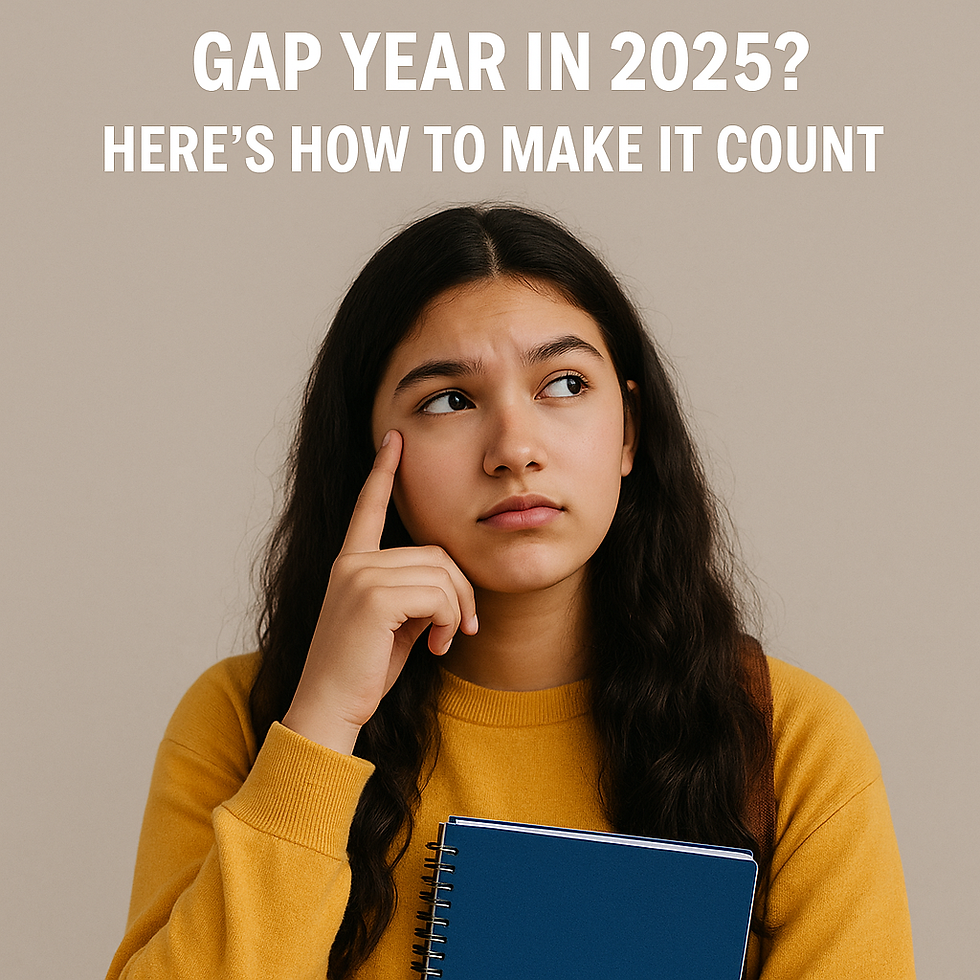University Admissions - Utilizing Gap Year for profile building
- Kajal Tyagi

- Jul 23, 2025
- 8 min read
Updated: Aug 2, 2025

Taking a gap year used to feel like stepping off the beaten path. Today, it's becoming the smart choice for students who want to enter college with clarity, confidence, and real-world experience. If you're considering a gap year or trying to convince your parents, you're in the right place.
This isn't about taking a year off to do nothing. It's about taking a year to do everything that will make you a stronger, more focused student and person. Let's explore how you can turn those twelve months into the foundation for your future success.
What Exactly Is a Gap Year?
Think of a gap year as hitting the pause button on your academic journey to gain experiences you simply can't get in a classroom. It's typically a year between high school and college where you choose to explore, learn, and grow in ways that traditional education doesn't offer.
Some students use this time to travel and experience different cultures. Others pursue internships, volunteer work, or acquire new skills. The best gap years combine several of these experiences to create a well-rounded adventure that teaches you about yourself and the world around you.
A successful gap year isn't about randomly picking activities or just hanging out for a year. It's about thoughtfully choosing experiences that will challenge you, teach you, and help you discover what you're truly passionate about.
Why Students Take Gap Years: Real Stories, Real Reasons
Over the years, we've seen students choose gap years for various reasons, and each story is unique. Sometimes life throws unexpected challenges your way. We've worked with students who faced family tragedies that required them to stay close to home for support. Others discovered that despite their best efforts, their grades weren't quite enough to get into their dream university, and they needed time to strengthen their application.
Many students find themselves needing to retake standardized tests like the SAT or AP exams to improve their scores. Instead of rushing into college applications again, they use their gap year to properly prepare, take additional courses, and build a stronger academic foundation.
We've also seen students who got into college but felt unprepared for the financial commitment or simply weren't ready for the academic rigor. Rather than struggling through their first year, they took a gap year to mature, save money, and enter college with confidence.
The good thing about gap years is that, regardless of why you're taking one, you can transform it into a launching pad for success. Students who initially felt disappointed about delaying college often tell us later that their gap year was the best decision they ever made. They return to their studies more motivated, focused, and with real-world experience that makes their coursework more meaningful and relevant.
A research paper published in the Journal of Educational Psychology shows that gap year students typically perform better academically than their peers who went straight to college. They're more likely to graduate on time, take on leadership roles, and have clearer career goals.
The Real Benefits You'll Gain
You'll Discover What You Actually Want to Do
High school keeps you so busy that you rarely have time to explore your interests deeply. A gap year gives you the space to try different things and discover what genuinely excites you. Maybe you think you want to be a doctor, but after volunteering at a hospital, you realize you're more interested in health policy. Or perhaps you discover a passion for environmental conservation while working on a sustainability project.
This exploration can save you from changing majors multiple times in college or, worse, ending up in a career you don't enjoy. When you start college, you'll have a clearer sense of direction and purpose.
You'll Develop Skills That Matter
Gap year experiences teach you practical skills that you can't learn from textbooks. You might develop communication skills while working with diverse groups of people, learn problem-solving through real-world challenges, or build leadership abilities by organizing projects or volunteering.
These skills make you more attractive to colleges and future employers. They show that you can apply your knowledge in real situations and work well with others.
You'll Gain Perspective on Your Life and Goals
Sometimes you need to step back to see the bigger picture. A gap year gives you the time and space to reflect on your values, interests, and goals. You'll return to your studies with a clearer sense of who you are and what you want to achieve.
This perspective can help you make better decisions throughout college and beyond. You'll be more intentional about your choices and more focused on what truly matters to you.
How to Plan Your Perfect Gap Year

Creating a meaningful gap year takes planning, but it doesn't have to be overwhelming. Here's how to approach it:
Start with Your Goals
Before you start researching programs or opportunities, think about what you want to achieve. Are you looking to explore potential career paths? Do you want to develop specific skills? Are you interested in making a difference in your community? Or do you simply need time to recharge and gain confidence?
Your goals will guide your decisions about how to spend your time. Write them down and refer back to them as you plan your year.
Document Your Journey and Build Your Network
Keep a journal, blog, or photo diary of your experiences. This reflection helps you process what you're learning and creates a record of your growth. It's also useful when you're applying to colleges or jobs later – you'll have specific examples of your experiences and what you learned from them.
Create a Professional Online Presence: Set up a LinkedIn profile and start building your professional network. Share updates about your gap year experiences, projects you're working on, and insights you're gaining. Connect with alumni from your high school or colleges you're interested in. Many professionals are happy to share advice and may even become mentors or provide opportunities.
Use LinkedIn to showcase your gap year achievements just as you would any other accomplishment. Write about the skills you're developing, the challenges you're overcoming, and the impact you're making. This not only helps you reflect on your growth but also demonstrates to colleges and future employers that you're using your time purposefully.
Gap Year Opportunities That Make a Difference
Volunteer and Community Service
Volunteering is one of the most popular and rewarding gap year activities. It allows you to contribute to causes you care about while developing skills and gaining perspective. You might work with children, help with environmental conservation, support community development projects, or assist with disaster relief efforts.
Look for opportunities that match your interests and allow you to take on meaningful responsibilities. The best volunteer experiences challenge you while making a real difference in the lives of others.
Internships and Work Experience
Professional internships give you insider knowledge about potential career paths. You'll learn what different jobs involve, develop professional skills, and build networks in your field of interest. Even if you decide the field isn't right for you, that's valuable information too.
Academic Preparation and Research Projects
If you're using your gap year to strengthen your academic foundation, there are several productive ways to spend your time. Many students dedicate part of their gap year to retaking standardized tests like the SAT, ACT, or AP exams. With the pressure of high school coursework removed, you can focus entirely on test preparation and often achieve significantly better scores.
Consider pursuing an independent research project in a field that interests you. Many universities and organizations offer research opportunities for gap year students. You might work with a professor on ongoing research, conduct your study under supervision, or participate in research programs designed specifically for pre-college students. These experiences not only strengthen your college applications but also give you valuable insight into academic work and potential career paths.
You could also use this time to take additional courses that will help you in college. Whether it's strengthening your math foundation, learning a programming language, or exploring subjects you didn't have time for in high school, targeted learning can give you a significant advantage when you start college.
Personal Projects and Entrepreneurship
If you're entrepreneurial or have a creative project you've been wanting to pursue, a gap year can be the perfect time to make it happen. Starting a small business, creating an artistic work, or developing a solution to a problem you care about can be incredibly rewarding and educational.
These projects teach you about planning, persistence, and bringing ideas to life – skills that will serve you throughout your life.
Cultural Exchange and Travel
If you have the resources, cultural exchange programs and travel can be incredibly eye-opening. Living in a different culture teaches you adaptability, cultural sensitivity, and gives you a global perspective that's increasingly valuable in our connected world.
Look for programs that emphasize cultural immersion rather than just sightseeing. Working with local organizations, staying with host families, or participating in cultural preservation projects can provide deeper, more meaningful experiences.
Addressing Common Concerns
"Will I Fall Behind Academically?"
This is probably the most common worry parents and students have about gap years. The evidence suggests the opposite is true – gap year students typically perform better academically than their peers. The key is to include some structured learning in your gap year plan and to stay intellectually engaged.
"Will Colleges Look Down on This?"
More and more colleges are recognizing the value of gap year experiences. Many admissions officers prefer students who have taken time to explore their interests and develop maturity. A well-planned gap year can strengthen your college application.
"What If I Lose Motivation to Go to College?"
While some students do decide to delay college further or pursue alternative paths, most gap year students are more motivated to continue their education. The key is to stay connected to your educational goals and use your gap year to explore how college fits into your larger plans.
Conclusion
Remember, this isn't about taking time off – it's about taking time to become the person you want to be. Your gap year can be the foundation for everything that comes next. The question isn't whether you can afford to take a gap year, but whether you can afford to miss this opportunity for growth and discovery.
If you've found yourself with a gap year ahead of you, remember that this isn't a setback—it's an opportunity waiting to be seized. Whether you planned for this break or circumstances led you here, you now have something invaluable: time to grow, explore, and prepare for your future in ways that your peers rushing straight to college won't experience.
A gap year isn't just a break from books — it's a bold step beyond the classroom. It's a chance to direct your energy into real-world learning, purposeful exploration, and personal growth. But make no mistake: this time requires focus. It’s not about drifting—it's about diving into experiences that shape who you are and who you want to become. Treat your gap year like a mission, not a vacation, and you'll return to your studies sharper, stronger, and more self-aware.
Make every month count. Make every experience a learning opportunity. Make your gap year the year that changes everything.
---------------------The End -------------------
EZScholar is an expert university admissions consultant and test prep organization which works with bright and ambitious students seeking admissions to Ivy Leagues, Oxbridge, Stanford, MIT, UC Berkeley, University of Toronto and other top global universities. Our experts have helped thousands of students with their profile building, research papers, extracurriculars, co-curriculars, test prep and admissions essays.
Need Additional Info:
a. Click here for Admission Support, Essays and SOP
b. Click here for SAT Prep
c. Click here for Research Papers




Comments